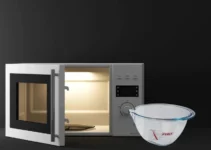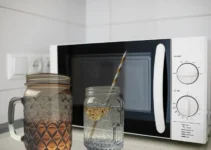Microwaves have become a staple in most households and are used for various purposes, but knowing how long to boil water in the microwave and to do it safely must have crossed your mind.
The time it takes for a microwave to boil water relies on several independent factors, such as wattage or the quantity of water. Usually, it takes around 1-4 minutes to boil a cup or 8 ounces of water in a microwave ranging from 500W-1200W power.
In this article, we’ll answer your question, “How long to boil water in microwave” and share some related queries that may help you get the best knowledge in this regard.
Can You Boil Water In A Microwave?

You can boil or heat water in a microwave, but you should take some precautions to ensure safety and prevent superheating. It is best to use a container with microwave safe symbol on it while boiling water, and do not cover the container with any lid.
Moreover, microwave the water in short bursts of 1-2 minutes and stir it after each interval to evenly distribute the heat.
NOTE: Heating water in a microwave slightly changes its properties due to the hot and cold spots formed as a result of uneven heat distribution.
How Long Does It Take To Boil Water in a Microwave?
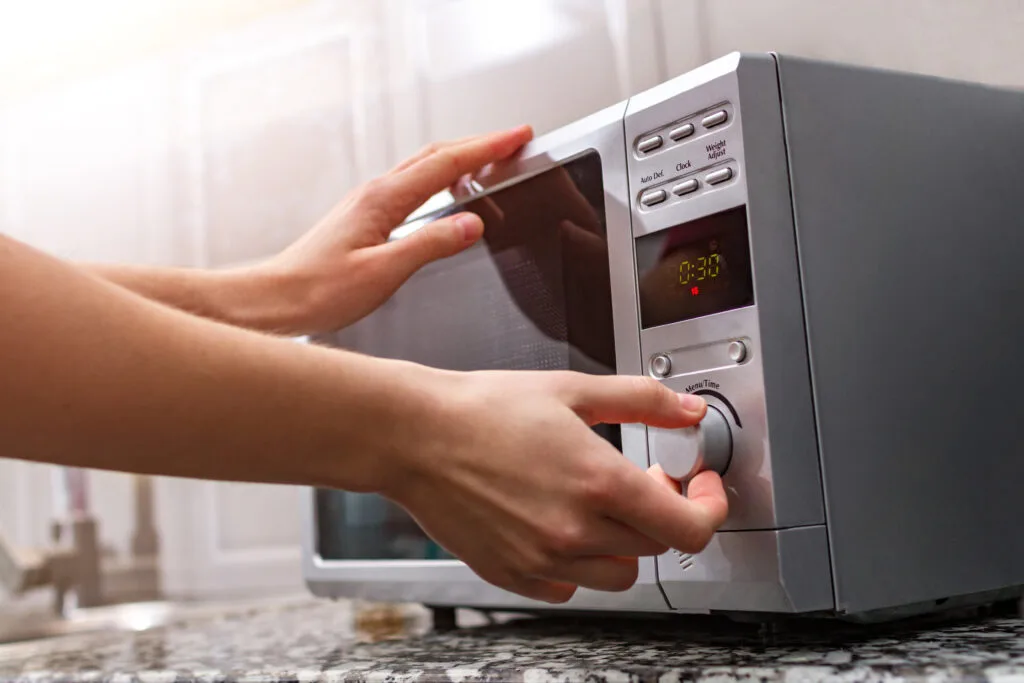
Usually, it takes around 1-2 minutes to boil a cup or 8 ounces of water in a microwave. However, the boiling time can vary depending on how powerful your microwave is and the quantity of water you are using in the container.
INFO: Glass and ceramic containers are considered microwave-safe.
Why Does Water Heat Up Quickly In Microwave?
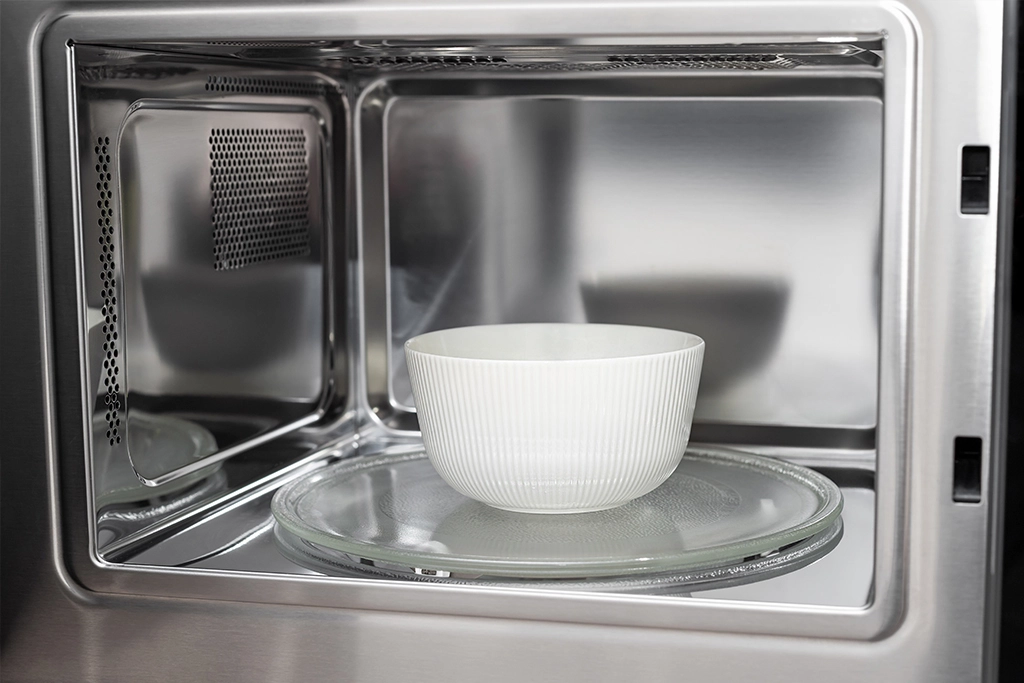
A Microwave heat up water faster than it can turn into vapor because the radiation rapidly interacts with the positive and negative charge of the water molecules, passing energy to them.
However, several factors can influence the boiling time of water in a microwave, such as its wattage, quantity, the ambient temperature of the water, and the container used.
Here’s a breakdown of all the key factors that affect the boiling time of water in a microwave:
- Microwave Wattage: Higher-wattage microwaves tend to heat water more quickly, as the power output directly affects the rate at which the water absorbs heat and reaches its boiling point.
- The volume of Water: Larger quantities of water require more energy and time to reach the boiling point than smaller volumes in the microwave.
- Initial Water Temperature: Already warm water will require less time to reach the boiling point than cold water in the appliance.
- Container Used: Microwaves heat water unevenly, and certain materials may absorb or reflect more microwave energy than others.
Is Boiling Water In The Microwave The Same?
Boiling water in the microwave is not the same as doing so in a kettle or on a stovetop. The main difference is that heat distribution in a microwave is uneven, meaning some parts of the water might be hotter than others.
This is because, in a microwave, the molecules start vibrating due to the radiation, creating heat in the water itself. While on the stove or in kettles, the heat is distributed evenly from the heating element through conduction to water molecules.
Also, the water might not bubble as much or at all in the microwave, making it harder to tell whether it is boiled enough. This can also cause superheating, where the water is boiled above its boiling point without boiling and can erupt out of the container when disturbed.
How To Boil Water In Microwave?
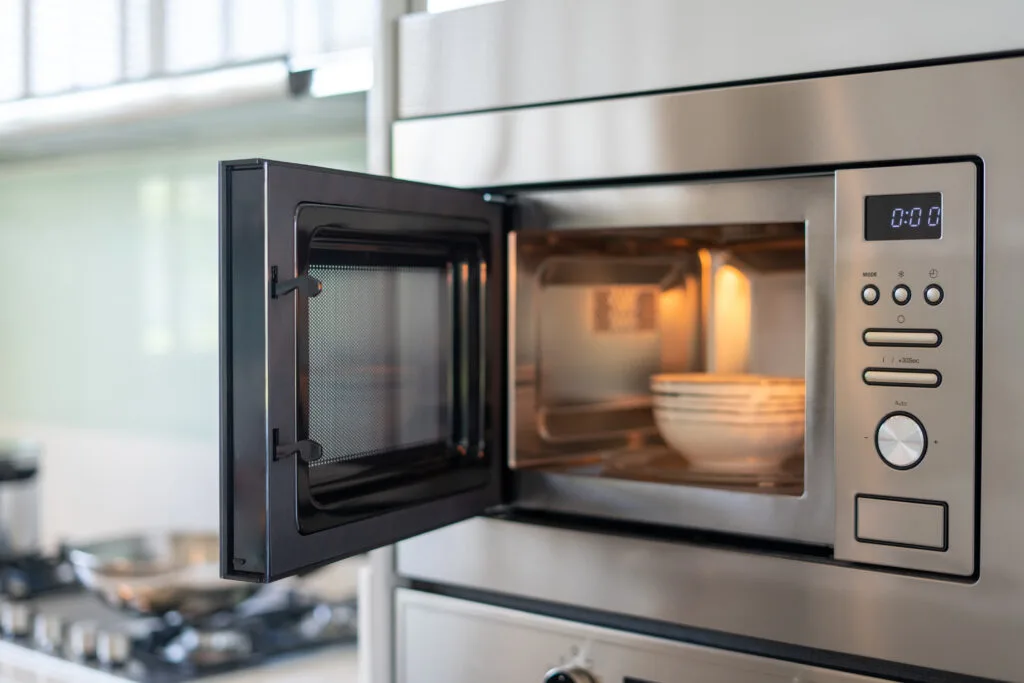
Knowing how to boil water in a microwave can save you effort and time, especially when you don’t have access to a stove or are in a hurry. Here is a step-by-step process to do this safely.
- Make sure you choose a container that is safe to use in a microwave. Avoid using metal, as it can cause a fire and damage your appliance.
- Fill the container with the amount of water that you need to boil. Make sure to leave some space at the top of the container.
- Place the container in the microwave and close the door. If your microwave has a turntable, make sure the container is placed in the center of it.
- Microwave the water on a high setting for 1-3 minutes. The boiling time varies depending on the wattage power of your microwave and the quantity of water heated. Keep an eye on the water as it heats up, as it may boil over if it gets too hot.
- After the microwave stops, let the water sit for a minute or two. Doing so will allow the water to cool down a little and prevent it from boiling over when you remove it from the microwave.
- Carefully remove the container from the microwave with the help of oven mitts and use it as needed for your recipe or beverage.
The time required to boil water in a microwave varies depending on its intended purpose.
- Making Hot Beverages: 1-2 minutes for tea or coffee.
- Sterilizing Water: 6-8 minutes when sterilizing water for medical purposes.
- Cooking Food: 3-5 minutes to boil water for making pasta or soup.
How Long To Heat Water In Microwave For Tea?
The time it takes to heat water in the microwave for tea depends on the amount and the appliance’s wattage. Generally, it takes 1-2 minutes in a standard 1000-watt microwave to heat 1 cup of water.
Another essential factor is the type of tea you are making. Since different teas have different average brewing temperatures and steeping times, you’ve to make sure to adjust the microwave settings accordingly.
For instance, black tea usually requires rolling boil water at 212°F or 100°C and steeping for 2-5 minutes. While green or white tea needs slightly cooler water just below boiling point (160°F to 180°F or 71°C to 82°C) and steep for up to 2 minutes.
How Long Does It Take To Boil Water With Different Microwave Wattages?
The time it takes for a microwave to boil a cup of water varies significantly based on its wattage, which is mentioned below:
- 500 watts – 4 Minutes
- 600 watts – 3.5 Minutes
- 700 watts – 3 Minutes
- 800 watts – 2.5 Minutes
- 1000 watts – 2 Minutes
- 1200 watts – 1.5 Minutes
Why Is It Risky To Boil Water in a Microwave?
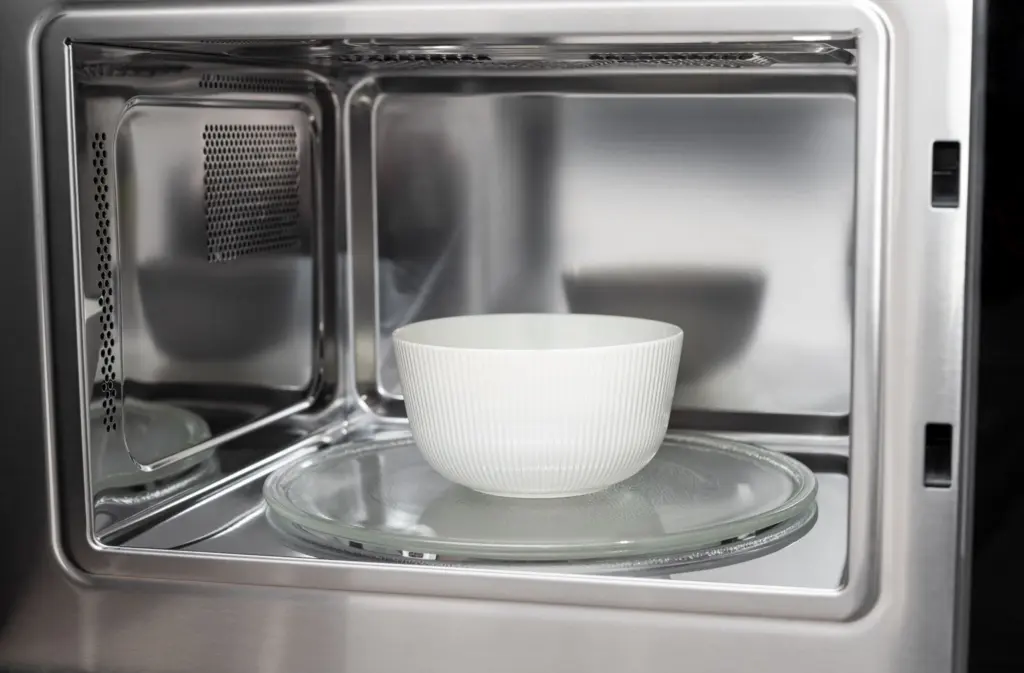
Boiling water in a microwave can be risky because it can cause the water to become superheated. This means it can exceed its boiling point without actually boiling, resulting in the water exploding out of the container once it is disturbed.
Additionally, the container used to heat the water may not be microwave safe, leading to potential chemical leaching and harmful fumes.
Moreover, microwaving water heats it to boiling, which makes the container and water very hot. Direct exposure to either can cause scalding or burning, leading to blisters and further complications if not treated.
What Are the Safety Precautions While Boiling Water in a Microwave?
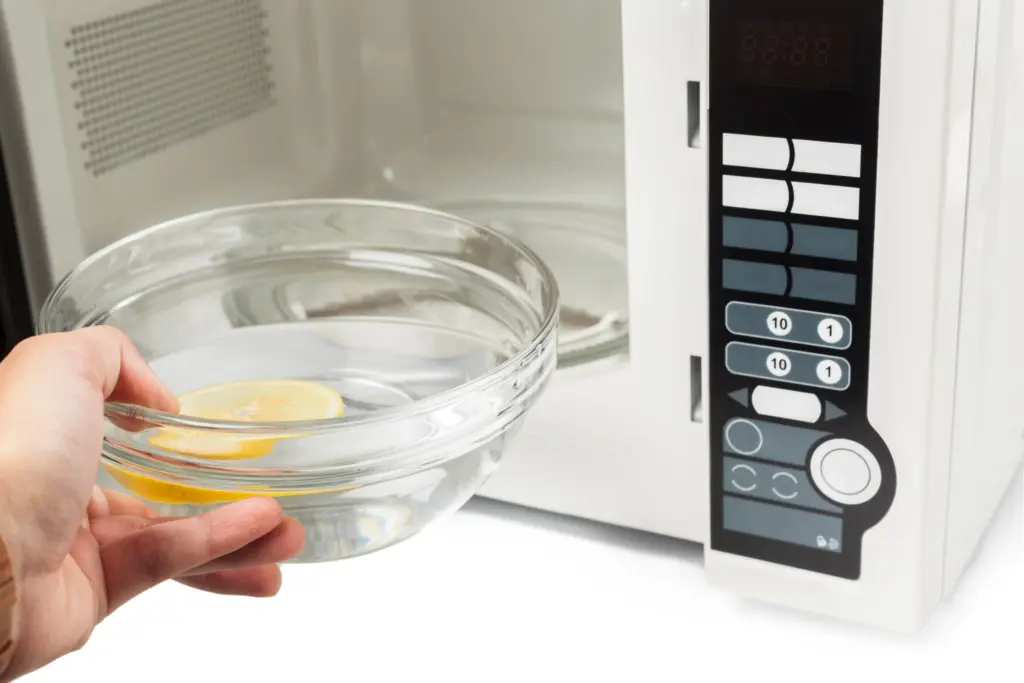
Although boiling water in a microwave may seem very easy, there are some precautions you must take to avoid health and safety hazards.
Avoid Plastic Containers
While some plastic containers are labeled microwave-safe, it is best to avoid using them for boiling water. The heat can cause the plastic to melt or release harmful chemicals into the water.
Don’t Use a Defected Glass Container
Inspect glass containers for any cracks, chips, or defects before using them in the microwave. Damaged glassware can shatter or break under the heat, posing a risk of injury.
Don’t Overfill the Container
As the water boils, it can rapidly expand and potentially overflow, causing burns or damaging the microwave. Also, leave enough headspace to allow for the expansion of water during boiling.
Avoid Using a Tightly Sealed Container
Don’t boil water in tightly sealed containers, such as bottles with tight caps, as the pressure can build up and cause the container to burst. Choose containers that allow steam to escape or use microwave-safe vented lids.
Follow Microwave Manufacturer’s Instructions
It’s essential to follow the instructions and safety guidelines provided by the microwave manufacturer since different models may have varying features, power levels, and recommended usage guidelines.
Insert a Non-Metallic Object
To prevent superheating, insert a non-metallic object, such as a microwave-safe spoon, into the water container. Doing so creates nucleation points for bubbles to form and reduces the risk of an explosive reaction when the water is disturbed.
Use a Lid or a Cover
Using a lid or cover on the container while boiling water in a microwave can prevent the water from splattering and causing burns. It also helps the water to retain heat and reach the boiling point faster.
Monitor the Process
Keep a close eye on the water boiling in the microwave. Avoid leaving the appliance unattended, as water can quickly reach its boiling point and potentially boil over.
Don’t Touch Microwave Interior
Avoid touching the interior surfaces of the microwave immediately after boiling water, as they may retain heat and cause severe burns.
Let the Water Cool Before Handling
After boiling water in a microwave, it may still be hot and can cause burns if you try to remove the container immediately. So let the water cool down a bit before holding the container.
Be Cautious When Removing The Container From The Microwave
Use a towel or oven mitts to remove the container from the microwave to protect your hands from any burn. Be careful not to spill the hot water, as it can cause hand burns and damage to the appliance surface.
Should I Boil Water in a Microwave or on a Stove?
Using a stove is a more reliable and effective way of boiling water because it provides a consistent and controllable heat source to safely let the water reach a boiling point of 100 degrees Celsius.
Doing so also ensures that the water is safe to consume, as the gradual process eliminates any harmful waterborne bacteria or viruses that may be present.
Additionally, boiling water on a stove utilizes less energy than an electric kettle or microwave.
Conclusion
In this article, we have discussed how long to boil water in microwave. We have also discussed a way to boil water in the microwave while taking specific preventive measures to avoid health and safety hazards.
We hope now you can still relish a comforting cup of warm tea or coffee despite having no access to a stove or kettle to heat water.
FAQs
Is It Cheaper To Boil Water in a Microwave?
No, it is not cheaper to boil water in a microwave because it is less efficient than kettles.
Microwave usually heats the water from the inside out and requires more energy, making electric kettles almost 80% cheaper to boil water.
Can Microwaving Water Purify It?
Microwaving water can purify it to some extent. In fact, studies show that when you microwave water for 90 seconds, it effectively kills certain microorganisms, such as waterborne bacteria and biofilms.
However, it is not the most reliable method as other purification processes because it does not affect chemical contaminants, such as pesticides, lead, and other pollutants. Moreover, purifying the water in a microwave might create a cold spot where some microbes could survive.
Does Microwaving Water Change The pH Level?
Microwaving the water slightly changes its pH level, molecule mobility, and conductivity compared to boiling water.
This is because the heat from microwave radiation removes carbon dioxide from the water, causing the pH level to increase.
What Happens If You Microwave Alkaline Water?
It is not recommended to microwave alkaline water because the radiation might damage its antioxidant properties or cause the loss of some important minerals.
How Long Does It Take To Boil 2 Cups of Water in the Microwave?
The time it takes to boil 2 cups of water in the microwave can vary depending on the microwave’s wattage. Usually, it would take 2-3 minutes for two cups or 16 ounces of water to boil in a microwave.
Can Boiling Water in a Microwave Explode?
Yes, boiling water in a microwave can potentially explode because when it is heated, it may not bubble, even when it reaches boiling point. As a result, the water can become superheated.
When this water is disturbed, it can suddenly boil and release steam, causing an explosion.


